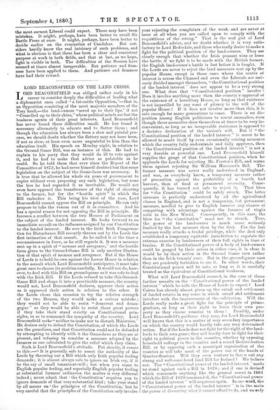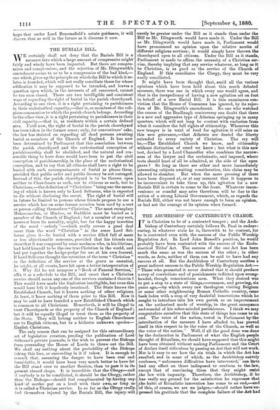LORD BEACONSFIELD ON THE LAND CRISIS.
LORD BEACONSFIELD was obliged rather early in his career to consider deeply the difficulties of leading what a diplomatist once called " a fat-cattle Opposition,"—that is, an Opposition consisting of the most majestic members of the Tory herd,—the land-owners "acred up to their lips," if not " Consolled up to their chins," whose political minds are but the business agents of their great interests. Lord Beaconsfield has never found these difficulties small. He has found it necessary alternately to educate and to flatter them ; and though the education has always been a slow and painful pro- cess, we should doubt whether the flattery may not have been, if not so slow, at least even more ungrateful to him than the education itself. His speech on Monday night, in relation to the Ground Game Bill, was an instance of this. He had to explain to his party that they would do ill to vote against it, and he had to make that advice as palatable as he could. So he told them that ever since the Report of the Committee of 1872, be had never himself doubted but that some legislation on the subject of the Game-laws was necessary. It is true that he allowed his whole six years of government to expire without even proposing any such legislation, but none the less he had regarded it as inevitable. He would not even have opposed the transference of the right of shooting to the farmer, but for the "hostile spirit" in which the Bill embodies it. This being his view of the case, Lord Beaconsfield cannot oppose the Bill on principle. He can only propose to take the venom out of it in committee. And he has a special reason for not opposing the Bill in principle. He foresees a conflict between the two Houses of Parliament on the subject of the landed interest. He looks forward to an immediate assault on the influence assigned by our Constitution to the landed interest. He sees in the little Irish Compensa- tion for Disturbance Bill recently thrown out by the Lords the first intimation of that assault. As he called it at the time a reconnaissance in force, so he still regards it. It was a measure sent up in a spirit of " menace and arrogance," and the hostile form given to the Ground-Game Bill is only another illustra- tion of that spirit of menace and arrogance. But if the House of Lords is to hold its own against the Lower House in relation to the assault which Lord Beaconsfield anticipates, it must take great care to choose its position carefully. It would not do, how- ever, to deal with this Bill on ground-game as it was safe to deal with the Irish Bill. If the Lords refused to take this Ground- Game Bill and shape it into a practicable measure, the country would not, Lord Beaconsfield declares, approve their action as it approved their action in relation to the other. If the Lords chose this occasion to try the relative strength of the two Houses, they would make a serious mistake ; they would not be able to resist " democrat and dema- gogue " as they would be able to resist those great powers if they take their stand strictly on Constitutional prin- ciples, so as to command the sympathy of the country. Lord Beaconsfield seeks" neither to make nor to disturb Ministries." He desires only to defend the Constitution, of which the Lords are the guardians, and that Constitution could not be defended by attempting to identify with it the Game-laws as they are at present, and refusing to consider a measure adopted by the farmers as one calculated to give the relief which they claim.
Such is Lord Beaconsfield's attitude. Put shortly, it comes to this :—" It is generally safe to assert the authority of the Lords by throwing out a Bill which only Irish popular feeling demands ; it is almost always safe to ignore an Irish cry, if it be the cry of small tenants-at-will ; but when you come to English popular feeling, and especially English popular feeling at substantial farmers ordinaries, the matter is very different indeed ; never admit that the Constitution' requires you to ignore demands of that very substantial kind ; take your stand by all means on • the principles of the Constitution,' but be very careful that the principles of the Constitution only involve
your rejecting the complaints of the weak, and are never at issue at all when you are called upon to comply with the requisitions of the strong." That is the real gist of Lord Beaconsfield's advice, and we doubt whether it is very satis- factory to Lord Redesdale, and those who really desire to make a fight for the political position of the land-owners. They see clearly enough that whether the Irish peasant wins or loses the battle, if no fight is to be made with the British farmer, the English land-owner's battle is lost before it is fought. If the Lords are never to reject the land measures sent up by the popular House, except in those cases where the centre of interest is across the Channel and even the Liberals are seri- ously divided amongst themselves, " the Constitutional position of the landed interest does not appear to be a very strong one. What does that "Constitutional position" involvel Does it involve anything more than the country's approval of the existence of a hereditary House; so long as that existence is not imperilled by any want of pliancy to the will of the popular House ? If it does not involve more than this, it is safe enough for many generations to come. There is no dis- position among English politicians to resent anomalies, even though these anomalies show themselves at times to be very in- convenient, so long as no insuperable resistance is opposed to a decisive declaration of the nation's will. But if " the Constitutional position of the landed interest is never to be allowed to assert itself by even occasionally. vetoing measures which the country fully understands and fully approves, then " the Constitutional position of the landed interest " is not a very durable or powerful one. Lord Beaconsfield himself supplies the gauge of that Constitutional position, when he applauds the Lords for rejecting Mr. Forster's Bill, and warns them against rejecting Sir William Harcourt's Bill. The former measure was never really understood in England? and was, as everybody knew, a temporary measure rather of precaution against the probability of a fourth bad
harvest, than of final or permanent necessity. Conse- quently, it has turned out safe to reject it. That blow for "the Constitution " could be safely struck. The latter measure is perfectly understood by all the agricultural classes in England, and is not a temporary, but permanent measure, needful to give to English farmers any chance of competing with advantage against the farmers of virgin soils in the New World. Consequently, in this case, the blow for " the Constitution " must not be struck. True, the power of the land-owner is much more seriously limited by the last measure than by the first. For the last measure really attacks a feudal privilege, while the first only established a temporary equitable jurisdiction to regulate the extreme exercise by landowners of their full rights in time of famine. If the Constitutional power of a body of land-owners could be gauged by their action in either case, it is clear it would be by their action in the Ground Game case rather than in the Irish tenants' case. But in the ground-game case they are prudently forbidden to use it. In other words, their Constitutional power will be safe, so long as it is carefully treated as the equivalent of Constitutional weakness.
What will Lord Beaconsfield counsel, in the case of those further assaults on the - Constitutional power of the landed interest " which he tells the House of Lords to expect ? Lord Cairns has already almost given up the entail and settlement of landed estates in any sense in which entail and settlement interfere with the improvement of the cultivation. Will the Lords really make a great fight for the principle of primo- geniture, so long as their right to leave their own pro- perty as they choose remains to them ? Possibly, under Lord Beaconsfield's guidance they may, for Lord Beaconsfield well knows that this is a matter of very secondary importance on which the country would hardly take any very determined action. But if the Lords dare not fight for the right of the land- lords to their own game; they will hardly dare to fight for their right to political power in the counties, whether by opposing household suffrage in the counties and a sound Redistribution Bill, or by opposing such a municipal organisation of the counties as will take most of the power out of the hands of Quarter-Sessions. Will they even venture to throw out any strong and well-considered land Bill for Ireland ? We believe not. The " Constitutional power of the landed interest " made no stand against such a Bill in 1870 ; and if one is devised which commands anything like the general assent in 1881 which the Bill of 1870 commanded, the " Constitutional power of the landed interest " will acquiesce again. In one word, the "Constitutional power of the landed interest" is in the main the power of discerning what it cannot afford to do, and we .nly
hope that under Lord Beaconsfield's astute guidance, it will discern that as well in the future as it discerns it now.



































 Previous page
Previous page